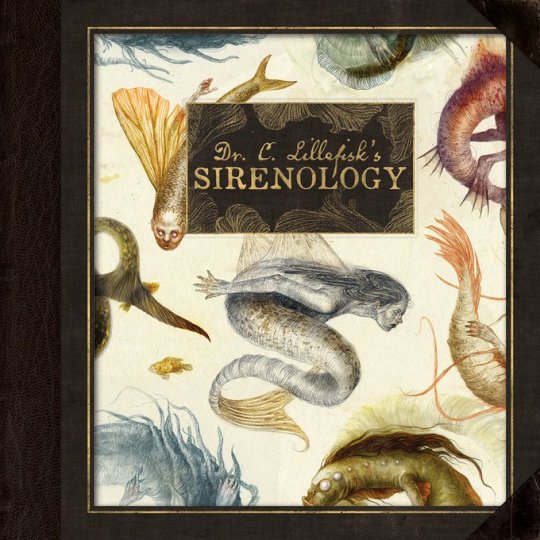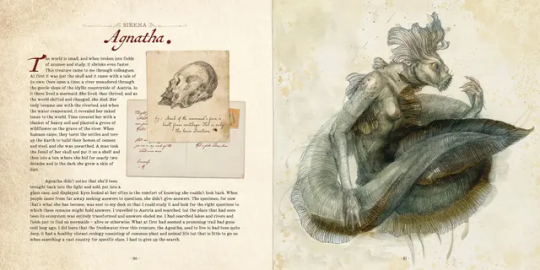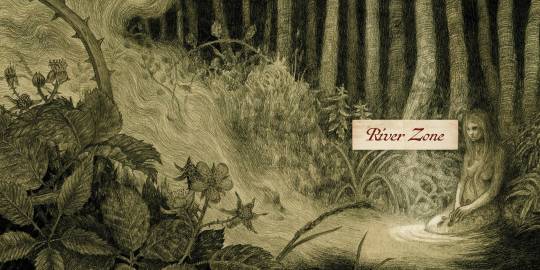#Her name is just grammatically incorrect Swedish
Text

I just noticed I didn't tell you yet--which is shameful as it is Tumblr where the Mermaid Scientist was born!
My Mermaid Book was picked up by Eye of Newt and is available for pre-order right now (it's coming out very soon, though, so any orders should make it until Christmas if that's a concern of yours)!
If you're in North America, I'd suggest ordering directly through my publisher's website, however it's available anywhere you'd usually order books. You can ask your favourite indie book shop to order it for you or--if there's no other option or you're worried about crazy shipping costs where you live--it's available via the place starting with A, which shall otherwise not be named, as well.
Please note: This is an edited version of the original book. It's shorter, but with more coherent world building and a beautiful new layout and design. It's a proper field guide now!


#Mermaid book#books#mermaids#field guide#art book#this makes me a traditionally published author-illustrator now :DDD#when we talked about editing the book for publication my publisher was like#we love Dr Lillefisk#Let's keep her!#Now she's in the title!#I made her up on a whim!#Her name is just grammatically incorrect Swedish#I love it so much#just thinking about how everything started and came together#and the book changed and grew and now#7 years later this is where we are!#my publisher send me the video btw#I can't wait to get the book myself!!
214 notes
·
View notes
Note
Asking because you've posted about Nerþuz before but aside from Tacitus, and prior to Nerþuz becoming Njord, is there any other mention of her anyway?
No, Tacitus' Germania is the only time she's mentioned. There's a good summary of the philological questions about this in John McKinnell's Meeting the Other in Norse Myth and Legend: https://books.google.co.uk/books?id=P2x2x3neFywC&pg=PA50&source=gbs_toc_r&cad=3#v=onepage&q&f=false although it neglects to mention that both Latin and the Germanic languages did have feminine u-stem nouns (though they are rare in both).
I feel the need to specify that it isn't known that Nerþuz the goddess became the god Njǫrðr, just that the word *nerþuz regularly develops into the word Njǫrðr according to the well-understood sequence of phonological changes underlying Old Norse.
I've tended to emphasize the idea of them being "the same" (i.e. a continuous but constantly changing tradition of recognizing a single deity by that name) over the alternative (that the Eddic Njǫrðr develops from the remnants of an older tradition recognizing two separate deities with the same name) only because the latter seems more popular among heathens despite neither theory being preferable over the other on any philological grounds. Like, it seemed weird to me that nobody outside of academia seemed to be considering the possibility.
Speaking from experience, there seem to be a lot of heathens who think there was a Norse god named Njǫrðr and a Norse goddess named Nerthus and they were husband and wife. It might be pedantic for me to object to this on the grounds that Nerthus is a Latinized version of a Germanic word from around the year 100 and Njǫrðr is a word from around a thousand years later, and these words were not ever spoken by the same people at the same time until modern times, but at the end of the day the theory that they were once husband and wife can't actually be rejected, and it isn't very practical to have a god named Njǫrðr and a goddess named Njǫrðr.
Yes, yes, I know, "Njärd" or whatever, but that is wrong, that's just regional Swedish for Njǫrðr (likely from the genitive case). The archaeologists pushing for recognizing "a grammatically feminine equivalent to Njǫrðr in place names" are just incorrect about sound change. They're etymologically the same word. Had *nerþuz (f.) carried down into Old Norse it would likely be *Njǫrð in the nominative but the loss of -r would be analogical, not phonological, and the genitive of both would be the same (Njarðar).
20 notes
·
View notes